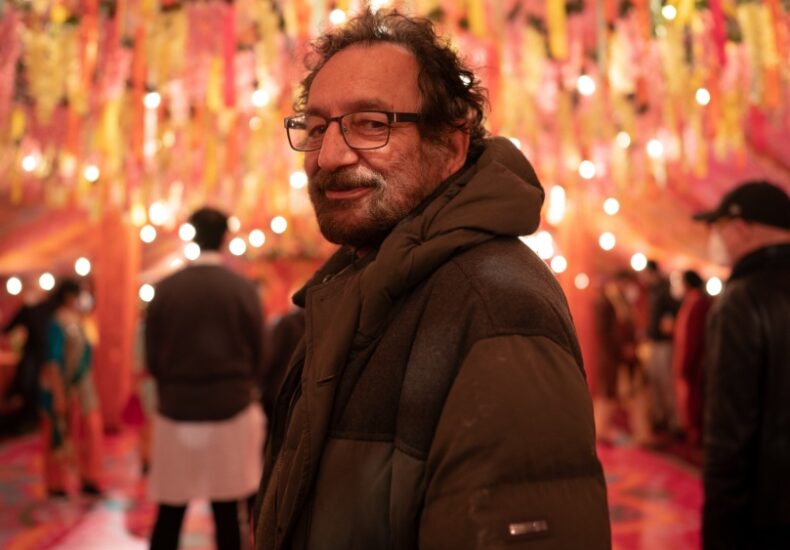
Shekhar Kapur Warns Studios Face Collapse as AI Democratizes Filmmaking at WAVES Film Bazaar
Acclaimed filmmaker Shekhar Kapur delivered a stark warning to Hollywood studios and tech giants at WAVES Film Bazaar, declaring that artificial intelligence will trigger the collapse of traditional entertainment industry hierarchies and predicting that major corporations built on high entry barriers may not survive the transition. Speaking at a session titled “Bringing AI and Creativity Together to Craft Stories that Inspire,” moderated by Sujay Sen, executive VP and global head of interactive services at LTI Mindtree, the director of “Elizabeth” and “Bandit Queen” emerged from judging entries for India’s first AI Film Festival with a provocative assessment: “Large corporations are about to fall because the pyramid is going flat. New corporations will be formed.” WAVES Film Bazaar is the market component of the International Film Festival of India (IFFI), where Kapur is the festival director. Kapur’s comments came after viewing entries from 181 teams who participated in a 48-hour AI filmmaking hackathon, creating two-minute films on the theme of “memories” using only AI tools. The participants were not professional filmmakers but artists, students and writers exploring AI’s creative potential. “The first thing I said is that we should retire. Literally, I’m not kidding,” Kapur stated, noting the quality of work produced in such a short timeframe would have been impossible with traditional filmmaking methods. Central to Kapur’s thesis is what he calls “the collapse of the pyramid” the breakdown of traditional hierarchical structures in both corporate and creative industries. He illustrated this with a parable about a CEO preparing to raise $10 billion who discovers that his cleaning lady, armed only with AI prompting skills and intuition, can write a better investment pitch than his MIT and Harvard-educated team. “The cleaning lady knows more about raising $10 billion than he does because she learned the art of prompting and went at it with full force and emotion,” Kapur explained. “She had intuition, and she used her intuition with all the help from AI.” The director argued that AI drastically lowers entry barriers to filmmaking. “The best thing about AI is it’s the most democratic technology. There is a $300 million film that can now be made in $300, 000. If it’s India, it can be made in $30,000,” he said. Kapur predicted that major studios and large corporations will face collapse as AI democratizes content creation. He pointed to practical limitations already constraining traditional cinema: “In India, we have only 8, 000 working screens. We keep talking about India as the greatest filmmaking nation in the world, but we have only 8, 000 screens,” he noted, adding that similar constraints exist in the U. K. and the U. S. His solution: AI will create its own distribution platforms, much as TikTok and YouTube have done. “We have to assume, if you want to tell stories and you can’t get to a theater, an AI film could do very quickly. I can make an ‘Avatar’ for YouTube of the same quality with AI.” Kapur also issued pointed warnings to executives: “CEOs tell me, ‘Oh my God, what’s going to happen to jobs?’ And I tell them, be careful of your job, because people will not want to work for you. AI will allow people to explore themselves. Everybody will want to be their own CEO.” He cautioned tech companies with massive AI valuations as well: “Don’t trust tech companies and their trillion dollar valuations. It’s like poker. Nobody’s seen any money, nobody’s seen their cards. We are in the potential of the valuation of these huge AI companies being driven by Wall Street.” The filmmaker believes places like India and China will lead AI adoption because “here we need AI for people to progress.” Despite AI’s capabilities, Kapur emphasized that the technology cannot replace fundamental human experiences. “AI cannot be human. AI is artificial intelligence. We don’t even know where intelligence resides,” he said, noting recent neuroscience research suggesting intelligence may reside in the heart and microbiome as much as the brain. The director argued that human qualities like hope, fear and faith remain beyond AI’s reach. “The only time that AI can take over humanity is if we have so much inertia that we become predictable,” Kapur explained. When asked about AI’s current limitations in filmmaking, Kapur identified a major challenge. “In AI, we still don’t know how to create close-ups, and there’s a very specific reason: we have something that science has not worked out yet a relationship between pupils,” he explained, noting that human pupils change thousands of times per second in ways current technology cannot replicate. Addressing concerns about shorter attention spans driven by social media, Kapur suggested the causality might be reversed: “Is it getting shorter and shorter because we are becoming as human beings having shorter attention spans? Or is it getting shorter because films are getting shorter?” Despite this, Kapur insisted storytelling fundamentals remain unchanged. “Storytelling never changes. Storytelling is the way we communicate with each other. Everything is a story,” he said, citing influences from Japanese director Kurosawa Akira, whose visual storytelling transcends language barriers. During a lighter segment, Kapur revealed his favorite actor is his uncle, late Bollywood icon Dev Anand, and identified Kurosawa as his greatest directorial influence. The session concluded with Kapur’s philosophical response to a time machine thought experiment, noting that time itself is relative: “Time is your perception of past, present and future. There is no time unless you perceive it.” The AI Film Festival’s hackathon entries will be screened on Nov. 26. LTI Mindtree is partnering with Shekhar Kapur Films on the initiative, with plans to introduce AI filmmaking to students at a music school in Mumbai that Kapur helps run.
https://variety.com/2025/film/festivals/shekhar-kapur-studio-collapse-ai-filmmaking-1236591466/
You may also like
延伸阅读
You may be interested
Globe bets on prepaid fiber, sets expansion
No content was provided to convert. Please provide the text...
Bragging rights up as Samal makes 5150 debut
A stellar Open division field will be shooting for the...
DigiPlus launches P1-M surety bond program
MANILA, Philippines — DigiPlus Interactive Corp. has partnered with Philippine...
 The New York Times
The New York Times
- Federal Prosecutors Open Investigation Into Fed Chair Powell 2026 年 1 月 12 日 Glenn Thrush and Colby Smith
- You Can’t Drone Strike a Global Drug Chain 2026 年 1 月 12 日 Matias Spektor and Oto Montagner
- A New World Is Taking Shape, No Matter What Trump Does 2026 年 1 月 12 日 Sarang Shidore
- As Death Toll Surges in Iran, Leaders Take Tough Line Against Protesters 2026 年 1 月 12 日 Erika Solomon and Sanam Mahoozi
- Golden Globes 2026 Photos: Stars of ‘Hamnet,’ ‘One Battle After Another’ and More 2026 年 1 月 12 日 Sinna Nasseri
- Golden Globes 2026 Red Carpet: Nikki Glaser, Teyana Taylor, Jean Smart, Timothée Chalamet and More 2026 年 1 月 12 日 The Styles Desk
- Golden Globes Winners 2026: Full List Including ’One Battle After Another,’ ‘Sinners’ and ‘Adolescence’ 2026 年 1 月 12 日 Shivani Gonzalez
- Somalis Fled Civil War and Built a Community. Now They Are a Target. 2026 年 1 月 12 日 Jazmine Ulloa, Campbell Robertson and Jamie Kelter Davis
- Mayor Mamdani Is Moving On Up to Gracie Mansion 2026 年 1 月 12 日 Eliza Shapiro and William K. Rashbaum
- Avalanche in Washington State Kills 2 2026 年 1 月 12 日 Livia Albeck-Ripka



Leave a Reply